Since coming out unapologetically as a woman in recovery from a dissociative disorder in 2018, I’ve received so many messages and social media replies that begin with this greeting. Being “out” has many meanings and layers for me—I’ve never hidden the fact that I’m in recovery from alcoholism and drug addiction, even though my advisers in the mental health field cautioned me about the perils of broadcasting it. In 2015 I made the decision to come out in every area of my life—to my professional following and to my conservative family—as bisexual, even though I never kept it a secret from my friends. Inspired by a Robert Ackerman teaching, I realized that I could not be a healthy woman in long-term recovery unless honesty prevailed about everything. And this led me to coming out with the dissociative disorder. Dissociative disorders are still highly stigmatized and largely misunderstood in the mental health professions, let alone by the general public. So many clinicians are afraid of us destabilizing and if the public even recognizes what a dissociative disorder is, old school portrayals of multiple personality disorders as seen in the movies generally serve as the association. In reality we are just people with many parts that form to protect the core self or to meet a need, generally in response to trauma. Sometimes the parts play well with each other, other times they don’t. With each vulnerable step I’ve taken further out of the shame closet, especially as a public figure in my field, I’ve learned an important lesson about vulnerability—people are simultaneously in awe of it and terrified of its power.
While the pop psychology understanding of vulnerability implies that one might get hurt if they want to take risks to grow, I will go a step farther and contend that hurt of all kind is inevitable. Here’s the lesson I’ve learned in my processes of coming out: Vulnerability is facing our wounding head-on and then deciding what we’re going to do in response to its impact. Are we going to ignore the wounds and thus open ourselves up to being hurt even more, or will we take the chance of feeling the pain we’ve stuffed down all the way through in order to experience freedom on the other side? I will spare you the details of my entire trauma narrative, yet I’ll paint enough of a picture to qualify. By age four it was clear to me that I was too sensitive to survive the life I’d been dealt. By age nine I was already thinking of ways to destroy myself because I didn’t feel safe either at home or at school, and by 19 I was in full-blown addiction, the ultimate response of a developing brain that was bonded to dissociation in order to survive. I was born suseptible; life made me increasingly more vulnerable. Hurt was my baseline, and even though I got sober at 23, it wasn’t until 25 that the chronic suicidal ideation largely dissipated. Had I kept all of this bottled in, assuming I would have survived past my thirties, I’d still be hurting, albeit in a much more pervasive way and I’d not be writing this today as a sober woman. Sharing the pain with others is imperative, and I first learned how to do this privately with an amazingly trauma-focused sponsor in a 12-step program, then through high quality trauma therapy. I agree with Brené’s fundamental teaching that shame cannot survive when it is shared in safe spaces.
So why choose to be so public? Isn’t that the opposite of a safe space? In many ways, yes. Even though speaking freely about one’s recovery can be encouraged in certain circles, there is still a faction of the mental health field that is extremely uncomfortable with the practice. A painful lesson I’ve learned is that some people, including other professionals, can be downright hateful with their comments, or dismiss me as someone who can’t be trusted because I am either too unstable or I make it all about me. Some of these comments have been shared directly with me, in public forums or at conferences. Others have suggested that what I have to share from my lived experience isn’t as valuable as what the literature can back up with numbers and protocols. And others get downright silent and squeamish when I talk about surviving a clinically significant dissociative disorder and all that accompanies it (e.g., suicidal ideation, self-injury, addiction). A great deal that has been said behind my back has also been relayed to me—particularly that I have no boundaries for sharing so much of my story, or that it’s dangerous that I’ve let myself be the client in EMDR demonstration videos, letting colleagues work on me.
I expected all of these criticisms when I wrote my coming out article in 2018. I have three very easy answers for these critics that I’ve realized in the two years of ardent advocacy work that’s followed: (a) academic work in dissociation is important, and so is lived experience—we lose our soul as clinical professionals when we minimize that, (b) I don’t share anything publicly that I haven’t first addressed privately; may I suggest you look at what bothers you the most about my disclosures and ask if this is revealing something unhealed in you, (c) why haven’t you let someone do a public demonstration on you? While I respect everyone’s right to privately work on what they need to, if you are a clinical trainer or public figure, showing your vulnerability, i.e., your wounds will always help to diffuse the horrific us vs. them divide that promotes mental health stigma in society. Add these all to the pile of lessons.
I am public for all of the people, especially other professionals, thanking me for being so open in my position of privilege about things that our field has kept shrouded in mystery and shame. Especially dissociation. This is a particularly powerful lesson I’ve learned about vulnerability—when you put yourself out there and take a further beating for it—people who are prepared to hear it will be challenged into healing action. I’ve bore witness to many professional “comings out” as someone with a dissociative disorder, often for the first time. There is so much fear that they will be misunderstood (at best) or terminated (at worst) in their settings or larger clinical communities if they speak freely. Many people with dissociative disorders keep their condition hidden from their partners and their families, scared of the ramifications. For many of us it’s just easier to label what we have as something else—like PTSD or a bipolar disorder.
Yet in reality, dissociative minds have a masterful capacity to solve complex puzzles—we are often the most brilliant thinkers and leaders in any of our chosen professions. We are the ones who, if unafraid, jump in there and get things done, watching the professional committees in our fields wax on philosophically and theoretically about what should be done. Our dissociative minds are made of heart and soul, and when that can be appreciated and worked with instead of denigrated, the world can and will be changed for the better. When I know that my public sharing can validate even one other person with a dissociative disorder or other condition that is accompanied by a great deal of dissociation, being vulnerable in the way I’ve chosen to be feels more than worth it. I live for the day when public vulnerability is accepted as the norm and not seen as something out of the ordinary; I work to make that future a reality. And while recognizing this mission as my life’s work is one of the most important lessons of my coming out, it’s not the most important.
So here I am today…eighteen years sober, “adult years,” if you will. I am still sifting through the layers and healing them as they are revealed and peeled back. I remain a hopeless train wreck in the romantic relationship department. Every time I try to date, I’m reminded of what my late friend Denise S. used to tell me—our relational parts of our lives can be the last to heal because they were the first to get wounded. I stay in my own counseling to address these injuries, knowing that I’m headed in the direction of greater health. I am navigating the waters of our current social climate, and I take my role as an anti-racist professional committed to doing my part to end the sting of systemic racism. I also know that the greatest service I can provide is to continue to do my own trauma work and help others to do the same. That’s how I changed for the better as a human and as a citizen, yet I cannot rest on this progress. I’m currently taking a good, hard look at how I’ve benefited from the American system existing as it is. And I know that getting uncomfortable and yes, vulnerable, is required on my part to make a real difference. This may involve me losing more family members, more friends, and more colleagues. Being vulnerable has taught me and continues to teach me that when I put myself out there honestly, things will always work out as they are intended. And I will feel inevitably feel healthier and more restored to sanity in the process.
Photography and Body Art by Michael John Gargano


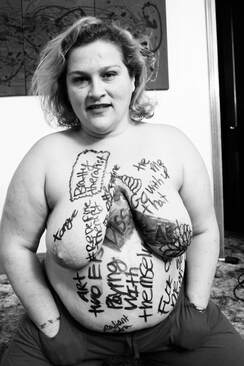
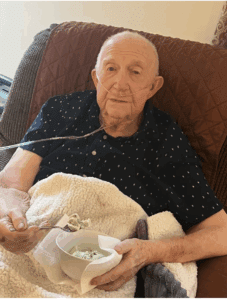



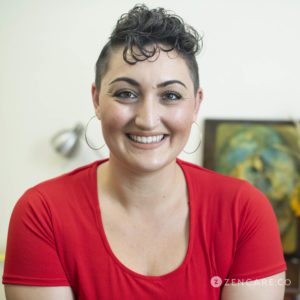





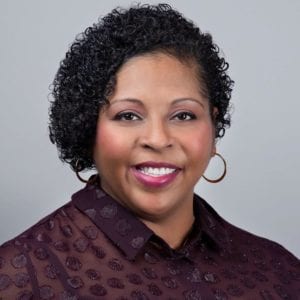
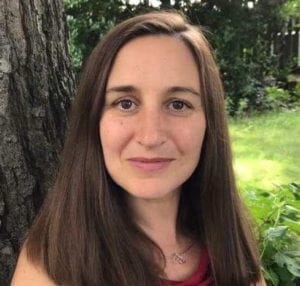

One Response
I applaud you Jamie for being so bold and brave. Your article made me sit a little straighter in myself, especially the positive comments about our fractured minds leading us to be great thinkers and leaders.
Thank you.